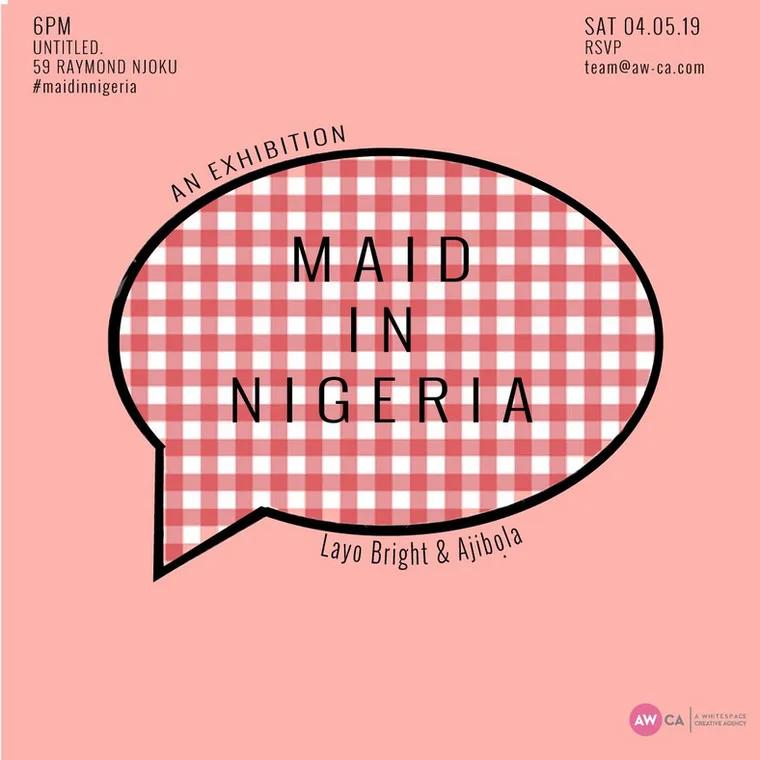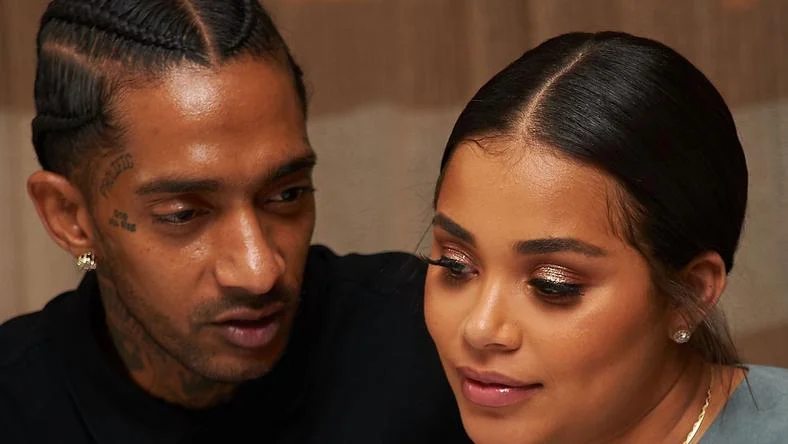Meet the two artists tackling the plight of domestic help in Nigeria through their enlightening new exhibition
Through their art, two artists are provoking a necessary conversation about the ill-treatment and human rights abuses domestic help face in Nigeria.
Many households make use of domestic help; men, women and oftentimes, underage children who take up roles of servitude, sometimes in return for money, sometimes, simply for food and a roof over their heads. Without this help, most houses cannot function as they provide for the fundamental needs of each home; cooking, cleaning and looking after children.
Thanks to Nigeria’s slack and poorly enforced labour laws, with the people often undocumented, brought in from villages and passed around distant family members, keeping track of them is near impossible. Many fal through the cracks, failed by the system and the very people tasked with looking after them.
All too often, we hear harrowing stories of underaged children forced into domestic labour, paid unfair wages, subjected to abuse and prejudice along with a myriad of other issues that domestic workers face.
Beginning 4th May, 2018 at Whitespace, Ikoyi, multidisciplinary artists, Layo Bright and Ajibola will jointly present an expository exhibition, Maid In Nigeria, devoted to starting conversations around the labour, dignity of the human person, cultural norms and practices as well as the controversy around hiring helps in Nigeria.
Pulse sat down with the artists to better understand the inspiration behind this important exhibition and what they believe needs to change at a grassroots and governmental level in order for domestic help to be empowered and protected.
1. Why was doing this exhibition so important to you and what do you want people to take away from it?
LB: We have been in talks to collaborate on this exhibition for a few years now, and it has always been at the forefront to highlight the issue of domestic employment (particularly househelps) that is well known to us, yet very problematic in how we approach it. It is one of those issues that we have all come into contact with in one way or another, yet may be passive or culpable in the injustices surrounding it. We often encourage or accept it as status quo, which speaks to a larger power structure that begins in the home with reverberating effects in our society at large. The intention is for people to approach this exhibition with an open mind, and consider their proximity to the issues more intimately.
A: Before now, I have quietly, by my life choices, made a mission of positioning underdogs/the underserved to win. I have always thought of the soapbox as ineffectual in a very binary way – You’re either doing or yapping endlessly. With a new phase of my life, I am making new choices. Instead of ”either, or” why not “Yes, and…”
I like to say that my Art works with Memory as a device to provoke introspection, and that this premise is central to everything I try to touch with my work. I want people to remember that domestic staff are staff too. And more importantly that they are people as well. I also want to break the sense of removal/absolution that we usually have with such matters. There’s always someone, we always know that someone that treats domestic staff horribly. It is never us. I want everyone implicated. In so far as you have ever kept quiet about a friend who had a maid or houseboy that was under-18, then you are complicit. If you have ever watched/paid domestic staff pittance, you are complicit.
For me, it’s reminding people (that thing about memory again) of their identities – in this case -- as Masters. And in the process, reminding them of their own power in this unspoken social structure, with the intention that wield this power wisely.
2. What was the inspiration for doing an exhibition that highlighted the treatment of domestic help?
LB: During my MFA at Parsons, one of the first works I made was titled Aunty (2016), and considered the power structure evident in household employment between the employer (Madam), employee (house help), and child/children within the home (who often call their nanny/housekeeper "Aunty" as a sign of 'respect'). It is one of those subtleties; growing up and often changing house helps for one reason or the other, and how surprisingly common it is in most homes. In making that work, I realized how little
I knew about these women that nurtured me and played an important active role in my upbringing. What are their surnames? Where are they from? How many children do they have? How many siblings? What are their hobbies? What are their favorite meals? From major details to the minutest things, I couldn't answer those questions, and it was a moment for deep introspection into the culture surrounding this; that the personhood and agency of many house helps are reduced to stereotypes or not even cared for. Not to mention the host of injustices (ill-treatment, prejudice, meagre wages, emotional and physical abuse, etc.) that the issue calls to mind in a societal context.
A: It would be trite to reach for this or that incident and say oh this is where it began for me. However, it is one of those ills that we let burn slowly in the back of our consciousness. You see a lot growing up – in your own household, in that of neighbors or friends. And if you aren’t a total dickhead, it all stays with you. With Maid In Nigeria, I was content to have a conversation with Layo about one of the pieces in the Exhibition -- Aunty –and dish out ideas about this or that addition. And she said why not execute your ideas yourself. I paused and thought, “Wait, that’s not how I intended this conversation to go”. I will be honest and say that at first, I freaked out. Then, I said why not, because I am really famous for making really wise decisions on the fly
3. What is your personal stance on having domestic help and what are your thoughts on the master/servant dichotomy we have established in Nigeria?
LB: People make the decision to seek domestic help for various reasons ranging from work schedule to home upkeep, etc. The issue lies in the treatment and perception of the employees, once people 'hire' them. It often lacks equity: from terms of employment, to wages, to the conditions many are subjected to. And that is even assuming that they are of legal age to work. We are painfully familiar with the stories of children who are 'househelps'; its absolutely ridiculous (as with other issues in the country that disregard children's rights).
There are many things that can be traced to colonial rule in terms of the master/servant dichotomy, and even beyond that. How do we then recognize these tendencies, and change policy and social behavior to create a society that is more equitable?
A: If people don’t engage underage kids as domestic help, and treat the people that they do engage fairly and as they would themselves, then I think it’s perfectly fine.
I have an entire spiel about how, maybe by some chance that master-servant dichotomy that we have with domestic help, may come from the after-images of Colonialism? That said, I think it may delve deeper than that. It may come from the natural order of how messed up the current milieu of our [Nigerian] society is. We live in a deeply oppressive society, and rather than reach for kindness (This is where I would have loved to quote about the Phillip Zimbardo’s Psychology of Evil and the Stanford Experiment, but that has been debunked. FML), we pass down the oppression in a twisted kind of Trickle Down Economics (of Oppression).
4. What is your art background?
LB: I could go the formal route and say what’s on my CV in terms of art education: MFA Fine Art (Honors) 2018, Parsons School of Design, The New School, NY, USA. However it would be remiss of me to neglect to mention the years of research, observation, and curious exploration that formed my informal art practice before the MFA program. At Babcock University, whilst studying Law, I ran an extracurricular Art Club for 3 years. I also designed the Lady Justice statue for the Law Campus (Iperu, Ogun State).
A: I can’t say that I have the conventional path with anything in my life. And the same goes for my Art. It may border on grandiose, however I fancy that mine is more akin to the autodidact path that Da Vinci took in teaching himself all he needed, to create masterpieces for his Medici patrons. It began as a thing around my neck in 2010, as a story that made it difficult for me to breathe. So I told that story, and even though I wanted to burrow a hundred feet into the ground at first, the response made me wonder what was wrong with everyone but I kept writing. Photography may have followed naturally as another path through which I desired to express. And right at the start, I was a top 10 finalist at some Photo competition by Lagos Photo. My foray into materials and crossing the boundaries from written words on a page are from a recent re-plumbing of my depths in ways that I haven’t in the last half decade.
5. Talk us through the materials and mediums used in this exhibition and why you chose them?
LB: My material approach involves gleaning from personal and collective memory, to create visual compositions that address social issues we are all conversant of. There’s so much we affiliate with in terms of culture and urban life, that often goes unrecognised; but I believe these materials/objects shape our perceptions and experiences. They are often reminders of events in our history, and form a connective thread that helps us makes sense of the present.
A: I worked with gingham fabric, napkins and the written word as materials and mediums. The fabric strikes a chord of memory, in a way that creates a pliant mind. Then naturally, the progression from there on to written word, is intended to match a pliant mind with a desired path of introspection.
6. What conversation needs to be had at a governmental level about labour laws in order for things to change?
LB: Where to start. It has to do with enacting and enforcing laws that are on par with international guidelines. And I should add, reforming existing laws that aren’t comprehensive. There is so much disregard for this. A law can be enacted but what is the actual enforcement strategy to see this through? What are the deterrents in place to discourage infringement of these laws? Where there are only one or two cases of someone facing prison sentence for carrying out a violent act on their domestic help, what does that say? Regard for welfare of the citizens should be holistic; and citizens have a part to play in this. Holding one another accountable and setting an example; not being passive observers that wash hands clean of matters we think don’t concern us.
A: Man, an easy, good-for-print answer would be to hem and haw to the high heavens about policy decisions with respect to labour laws. However, if we are truly about making things change, we then have to ask: Is treating your fellow man as a human being a Policy problem or decency Problem? If we have the right laws, how do they get enforced? Do we need the right laws to actually have sense? In fact, if we understand the entire purpose of Law and Governance and how they were originally intended for only Edge Cases and Free Riders (a la Game Theory), the approach and the thinking becomes different.
7. How important do you think it is that more Nigerian artists use their platforms to challenge these vital issues?
LB: It is essential. For those that have a platform or way of communicating issues in their communities (whatever their background), regardless of geographical location, it’s important to do so.
A: The simple approach would be to go “OMG, it’s so important. Every artist should be doing this”. But my question rather is: Why not? Why isn’t every artist challenging vital issues? What is the entire point of *being* a platform if it isn’t to lift others with it?
8. What work can be done, at a grassroots level, to empower domestic help on a daily basis?
LB: We need to change perceptions by holding each other accountable. If you see something, say something; don’t just carry face. And not just in cases of violence. A friend is boasting that she’s not giving her domestic help a Christmas break; don’t just carry face or laugh. Or the friend that gives her domestic help a Christmas break and acts like it’s an act of kindness — tokenising basic work benefits is not the goal either. It should be the status quo, and thats the point. Information should be more accessible, and awareness made around, agencies that people can report cases to for abuse and violence. There are organisations, such as Here to Help (www.heretohelpngr.org) which seek to empower, enable and educate domestic workers in Nigeria. We can be advocates in our various communities, starting within our homes and expanding outward.
A: At a grassroots level, we can start by making sure we do not employ domestic help under the age of 18. Children should not have to be snatched from their own homes because of Poverty. That is on the one hand.
On the other, it’s that in whatever ways are possible, as you would with any other staff you have, invest in professional development. If that seems far-fetched/a bit much to you, then it speaks to how lowly *you* see domestic staff. That said, professional development can be everything from helping them get basic education, to learning trades. This is why, the work that folks like Here to Help NG are doing, is so vital. A focus on trying to empower domestic help, in spite all the obstacles that I imagine they must face, from employers, is very rare in the non-profit space.










